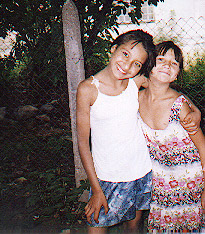When I arrived in Bulgaria in 1993, I had a lot to learn. So I kept my mouth shut and my eyes open. It was very obvious who the Gypsy’s were, in the main. Their cloths were very old and very dirty. Also the Gypsy’s in most cases are very, very dirty and only take a bath when they fall in a river, sort of thing. Again in most cases a person can see layers of dirt that have been there for months at a time. By this I mean a person can see different layers of dirt and different shades of dirt on their body and they really, really smell. In fact there is in a lot of cases, among the Gypsy’s, of a peculiar smell that is indigent to this race. A person can’t stand to be in the same room with them. And yet a person can meet a few Gypsy’s who are well educated and clean and have more money then I could ever hope to have. Yet, they smell.
In most cases the Gypsy’s don’t go to school and can’t read or write and in some cases can’t even sign their own name. So here we are with the Gypsy’s running all over Bulgaria, as they are everywhere and a person must be aware of who is near you, when walking down the street, as the Gypsy’s will steal the socks off you feet while you are still walking, sort of thing. Again there are a few who are really good people and are as honest as the day is long. So a person must take this into consideration also!! Just be aware of who is around you!!
Now getting to the Gypsy children, you will see that the life is very, very difficult. The Gypsy’s tend to have five, six and even more children, as the mortality rate is very high among the Gypsies and often the children have no mother or father that are alive, even when they know who their mother or father are. The rest of the Bulgarian people have, most of the times, two children and once in a while they will have three children, when there, is twins in the family. It is very, very hard financially to raise three children here in Bulgaria, because of the low wages and chronic unemployment.
When walking down the street a person can see a pair of legs sticking out of the garbage container and getting closer, you can see that it is a Gipsy child who has climbed into the contained, (Or you can see the parents putting the children into the containers.) to get something to eat or to find something that is of some value to sell, like paper, glass jars, copper, old cloths that people have thrown away or any one of a million things that a person throws away, but the Gypsies will fine value in. The older Gypsies almost always have an old baby buggy that only the wheels are still there and they use this to haul the things that they find in the garbage containers away, so they can sell these things. This is a really bad problem for the Gypsies in winter time.
Girl children in the Gipsy race are of more value, because some of them are of a lighter skin and can pass off as a normal part of society. Also the girl children in a lot of cases, at a very young age, (Even 8, 9, or 10 years old.), are selling their body on the street. While setting in the park taking care of Sasha, my young child, the Gipsy children will come up to me and ask if I want to have sex with them for one or two dollars. These children are like I said very young and they pull down their pants and show you everything. A person must tell them to go away and even then they will bother a person until a person must threaten to hit them if they don’t go away.
Now Bulgaria is trying to get into the European Union and the
Gypsy problem must be taken care of first. This is only one of many problems
that must be solved. There is the dogs running all over the place in packs, the
banks need a lot of reform. No personal checks in Bulgaria!! The mafia is
everywhere, the police are corrupt, and there are plenty of laws, but very
little rule of law. The list goes on and on!!

As can be seen, from the photo above, Gypsies are a happy people. What they
are happy about, I don’t know!! But there it is, go figure!!
| Home Page | Index Page | Section 39 | Section 41 A |